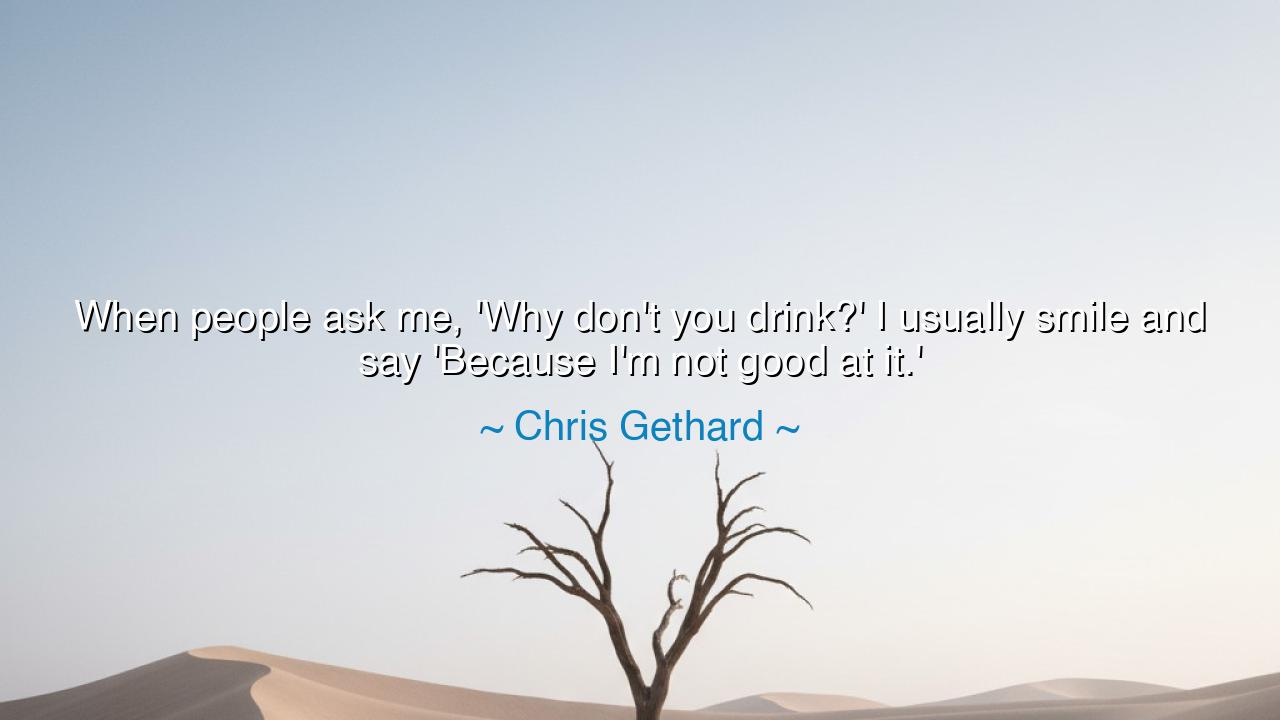
When people ask me, 'Why don't you drink?' I usually smile and
When people ask me, 'Why don't you drink?' I usually smile and say 'Because I'm not good at it.'






Chris Gethard, with the wit of a jester and the humility of a sage, once said: “When people ask me, 'Why don't you drink?' I usually smile and say 'Because I'm not good at it.'” On the surface, these words are humorous, a lighthearted jest. Yet, like many truths cloaked in laughter, they contain a wisdom both profound and enduring. For he teaches that one need not justify every choice with solemnity; sometimes, the simplest admission of human limitation, offered with a smile, is enough.
The ancients understood this balance well. The Delphic maxim, know thyself, carved upon the temple of Apollo, carried the same spirit. To know one’s weaknesses is not shameful, but honorable. To act as though one is invincible invites ruin; to acknowledge limitation invites strength. When Gethard says he is “not good at it,” he strips away pride, confessing with honesty what many deny. And in that confession lies freedom—freedom from expectation, from pressure, from the snares that destroy those who refuse to face themselves.
History gives us many examples of this truth. Consider the tale of Alexander the Great, whose conquests stretched from Greece to India. He was a genius of war, yet in his personal life, he struggled with excess. His downfall was hastened not by enemies, but by his inability to master his appetites. If he had admitted, as Gethard does, that he was “not good at it,” and chosen restraint, perhaps his empire might have endured longer. His tragedy is a reminder that greatness without self-knowledge is fragile as glass.
There is also a lesson in humility here. Gethard does not denounce drinking with condemnation, nor does he exalt himself for abstaining. Instead, he smiles, offering a gentle answer that disarms criticism. The power of this response is subtle yet mighty. For in a world where people are quick to judge, to pressure, to demand conformity, the smile becomes a shield, and humility becomes a sword. He does not impose his choice on others, but his quiet honesty inspires reflection in those who hear him.
The wisdom of this approach can be found in other traditions as well. The monks of old often renounced worldly pleasures, not because those pleasures were inherently evil, but because they knew they were not good at them—they sought peace in simplicity rather than risk corruption in indulgence. Likewise, the Stoics counseled moderation, reminding men that mastery of the self was worth more than mastery of the world. To smile at one’s weakness is not defeat; it is victory of a different kind.
And so, the lesson we draw from Gethard’s words is this: do not be ashamed of what you cannot master. Instead, acknowledge it, with honesty and even with humor. If a path brings you harm, step aside. If an action diminishes you, refrain. To say “I am not good at it” is not weakness, but wisdom. It is the voice of one who values life, clarity, and dignity above the fleeting approval of others.
Therefore, my children, remember this teaching: guard your heart, know your limits, and never be afraid to meet questions with both honesty and a smile. For the greatest victories are not always those won upon battlefields, but those won in the quiet choices that preserve your spirit. To recognize your weakness is the beginning of strength, and to admit it with grace is the sign of a soul truly free.






AAdministratorAdministrator
Welcome, honored guests. Please leave a comment, we will respond soon